Book5Unit1reading
- 格式:ppt
- 大小:3.35 MB
- 文档页数:26
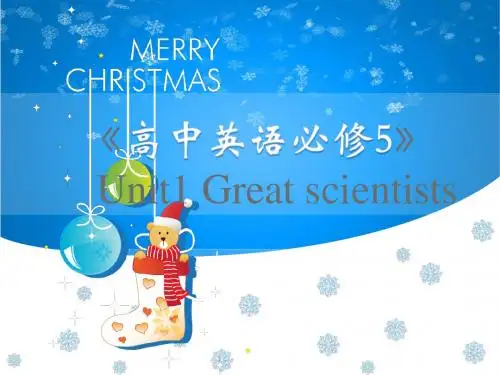

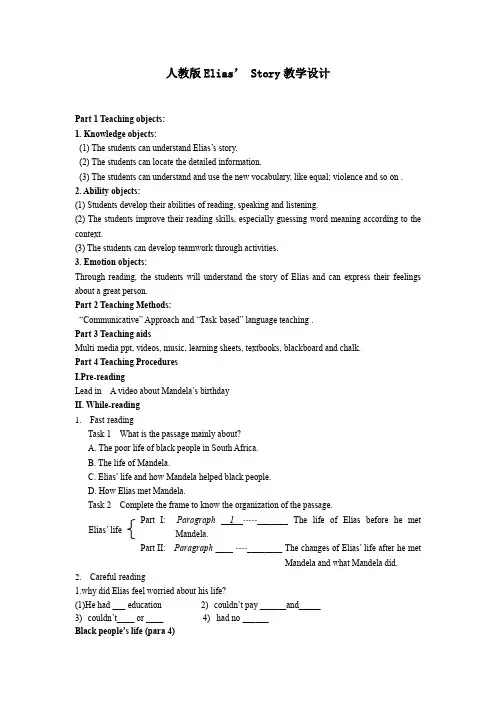
人教版Elias’ Story教学设计Part 1 Teaching objects:1. Knowledge objects:(1) The students can understand Elias’s story.(2) The students can locate the detailed information.(3) The students can understand and use the new vocabulary, like equal; violence and so on .2. Ability objects:(1) Students develop their abilities of reading, speaking and listening.(2) The students improve their reading skills, especially guessing word meaning according to the context.(3) The students can develop teamwork through activities.3. Emotion objects:Through reading, the students will understand the story of Elias and can express their feelings about a great person.Part 2 Teaching Methods:“Communicative” Approach and “Task-based” language teaching .Part 3 Teaching aidsMulti-media ppt, videos, music, learning sheets, textbooks, blackboard and chalk.Part 4 Teaching ProceduresI.Pre-readingLead in---A video about Mandela’s birthdayII. While-reading1.Fast-readingTask 1 What is the passage mainly about?A. The poor life of black people in South Africa.B. The life of Mandela.C. Elias’ life and how Mandela helped black people.D. How Elias met Mandela.Task 2 Complete the frame to know the organization of the passage.Part I: Paragraph __1__-----_______ The life of Elias before he met Elias’ lifeMandela.Part II: Paragraph ____ ----________ The changes of Elias’ life after he metMandela and what Mandela did.2.Careful-reading1.why did Elias feel worried about his life?(1)He had ___ education 2)couldn’t pay ______and_____3)couldn’t____ or ____ 4)had no ______Black people’s life (para 4)1.Analyze the sentence“ The last thirty years have seen the greatest number of laws stopping our rights and progress, until today we have reached a stage where we have almost no rights at all.”Part 2 The change of Elias’ life after he met Mandela.1.How did Mandela help them?①He helped Elias get the passbook.②He offered guidance to poor black people.③He joined the Youth league and became hopeful about their future.④He first attacked the unfair laws in a peaceful way.⑤He decided to answer violence with violence when there is no other ways.⑥Elias helped blow up some govenment buildings.A. ①②③B.①②③④⑥C. ①②④⑤2.What can we learn from Mandela?3.what changes happened to Elias’ life with Mandelas’ help?IV SummaryWork in groups ,one acts as Elias and the others as reporters.Reporters try to ask questions about Elias’ life.A: a news reporter B:EliasA: Nice to meet you, Elias.I’m …B: Nice to meet you, too.A: May I ask you a few questions?B: Of course, I’d like to answer them.A: Can you tell me about your life before you met Mandela?B:…A: I heard that Nelson Mandela had helped you a lot. Would you please say something about that?B: …A:were you afraid when you helped Mendela blow up the buildings?B:……A:Thank you for taking this interview.V. DiscussionIn our daily life, what should we do to make the world equal?politics:Daily life :Job hunting(找工作)…GovernmentThe colored race(有色人种)VI. Homework1.Find out all the attributive clauses in the text .2.Read The Rest of Elias’ Story on page 38.3.Surf the Internet for more information about Mandela.学情分析本次晒课用的是高一普通班的学生,通过高一上半学期的学习,学生已经适应了高中的教学节奏、模式和规律,学生的阅读技巧已有了解,但是还有待继续培养其能力,提升其情感,所以很有必要充分利用本单元的话题,帮助学生通过理解篇章来陶冶情操,让学生在学习中学会灵活运用,在启发式教学中学会自主探究学习,在小组活动中学会互相合作,共同促进,这也有利于学生英语素养的整体提升。
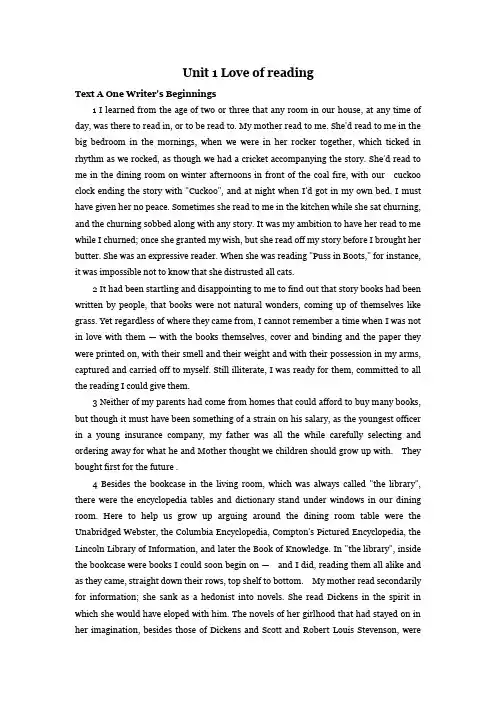
Unit 1 Love of readingText A One Writer's Beginnings1 I learned from the age of two or three that any room in our house, at any time of day, was there to read in, or to be read to. My mother read to me. She'd read to me in the big bedroom in the mornings, when we were in her rocker together, which ticked in rhythm as we rocked, as though we had a cricket accompanying the story. She'd read to me in the dining room on winter afternoons in front of the coal fire, with our cuckoo clock ending the story with "Cuckoo", and at night when I'd got in my own bed. I must have given her no peace. Sometimes she read to me in the kitchen while she sat churning, and the churning sobbed along with any story. It was my ambition to have her read to me while I churned; once she granted my wish, but she read off my story before I brought her butter. She was an expressive reader. When she was reading "Puss in Boots," for instance, it was impossible not to know that she distrusted all cats.2 It had been startling and disappointing to me to find out that story books had been written by people, that books were not natural wonders, coming up of themselves like grass. Yet regardless of where they came from, I cannot remember a time when I was not in love with them —with the books themselves, cover and binding and the paper they were printed on, with their smell and their weight and with their possession in my arms, captured and carried off to myself. Still illiterate, I was ready for them, committed to all the reading I could give them.3 Neither of my parents had come from homes that could afford to buy many books, but though it must have been something of a strain on his salary, as the youngest officer in a young insurance company, my father was all the while carefully selecting and ordering away for what he and Mother thought we children should grow up with. They bought first for the future .4 Besides the bookcase in the living room, which was always called "the library", there were the encyclopedia tables and dictionary stand under windows in our dining room. Here to help us grow up arguing around the dining room table were the Unabridged Webster, the Columbia Encyclopedia, Compton's Pictured Encyclopedia, the Lincoln Library of Information, and later the Book of Knowledge. In "the library", inside the bookcase were books I could soon begin on —and I did, reading them all alike and as they came, straight down their rows, top shelf to bottom. My mother read secondarily for information; she sank as a hedonist into novels. She read Dickens in the spirit in which she would have eloped with him. The novels of her girlhood that had stayed on in her imagination, besides those of Dickens and Scott and Robert Louis Stevenson, wereJane Eyre, Trilby, The Woman in White, Green Mansions, King Solomon's Mines.5 To both my parents I owe my early acquaintance with a beloved Mark Twain. There was a full set of Mark Twain and a short set of Ring Lardner in our bookcase, and those were the volumes that in time united us all, parents and children.6 Reading everything that stood before me was how I came upon a worn old book that had belonged to my father as a child. It was called Sanford and Merton. Is there anyone left who recognizes it, I wonder? It is the famous moral tale written by Thomas Day in the 1780s, but of him no mention is made on the title page of this book; here it is Sanford and Merton in Words of One Syllable by Mary Godolphin. Here are the rich boy and the poor boy and Mr. Barlow, their teacher and interlocutor, in long discourses alternating with dramatic scenes —anger and rescue allotted to the rich and the poor respectively. It ends with not one but two morals, both engraved on rings: "Do what you ought, come what may," and "If we would be great, we must first learn to be good."7 This book was lacking its front cover, the back held on by strips of pasted paper, now turned golden, in several layers, and the pages stained, flecked, and tattered around the edges; its garish illustrations had come unattached but were preserved, laid in. I had the feeling even in my heedless childhood that this was the only book my father as a little boy had had of his own. He had held onto it, and might have gone to sleep on its coverless face: he had lost his mother when he was seven. My father had never made any mention to his own children of the book, but he had brought it along with him from Ohio to our house and shelved it in our bookcase.8 My mother had brought from West Virginia that set of Dickens: those books looked sad, too — they had been through fire and water before I was born, she told me, and there they were, lined up — as I later realized, waiting for me.9 I was presented, from as early as I can remember, with books of my own, which appeared on my birthday and Christmas morning. Indeed, my parents could not give me books enough. They must have sacrificed to give me on my sixth or seventh birthday — it was after I became a reader for myself-the ten-volume set of Our Wonder World. These were beautifully made, heavy books I would lie down with on the floor in front of the dining room hearth, and more often than the rest volume 5, Every Child's Story Book, was under my eyes. There were the fairy tales —Grimm, Andersen, the English, the French, "Ali Baba and the Forty Thieves"; and there was Aesop and Reynard the Fox; there were the myths and legends, Robin Hood, King Arthur, and St. George and the Dragon, even the history of Joan of Arc; a whack of Pilgrim's Progress and a long piece of Gulliver. They all carried their classic illustrations. I located myself in these pages andcould go straight to the stories and pictures I loved; very often "The Yellow Dwarf" was first choice, with Walter Crane's Yellow Dwarf in full color making his terrifying appearance flanked by turkeys. Now that volume is as worn and backless and hanging apart as my father's poor Sanford and Merton. One measure of my love for Our Wonder World was that for a long time I wondered if I would go through fire and water for it as my mother had done for Charles Dickens; and the only comfort was to think I could ask my mother to do it for me.10 I believe I'm the only child I know of who grew up with this treasure in the house.I used to ask others, "Did you have Our Wonder World?" I'd have to tell them The Book of Knowledge could not hold a candle to it.11 I live in gratitude to my parents for initiating me —as early as I begged for it, without keeping me waiting — into knowledge of the word, into reading and spelling, by way of the alphabet. They taught it to me at home in time for me to begin to read before starting to school.12 Ever since I was first read to, then started reading to myself, there has never beena line read that I didn't hear. As my eyes followed the sentence, a voice was saying it silently to me. It isn't my mother's voice, or the voice of any person I can identify, certainly not my own. It is human, but inward, and it is inwardly that I listen to it. It is to me the voice of the story or the poem itself. The cadence, whatever it is that asks you to believe, the feeling that resides in the printed word, reaches me through the reader-voice: I have supposed, but never found out, that this is the case with all readers — to read as listeners — and with all writers, to write as listeners. It may be part of the desire to write. The sound of what falls on the page begins the process of testing it for truth , for me. Whether I am right to trust so far I don't know. By now I don't know whether I could do either one, reading or writing, without the other.13 My own words, when I am at work on a story, I hear too as they go, in the same voice that I hear when I read in books. When I write and the sound of it comes back to my ears, then I act to make my changes. I have always trusted this voice.作家起步时我从两三岁起就知道,家中随便在哪个房间里,白天无论在什么时间,都可以念书或听人念书。
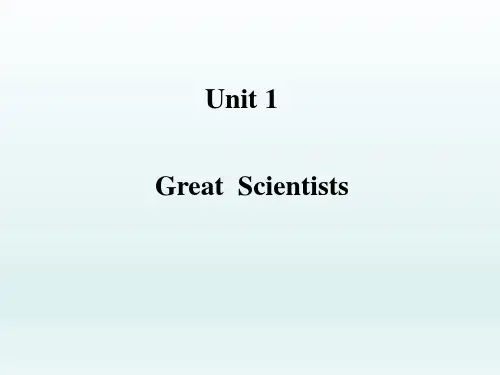

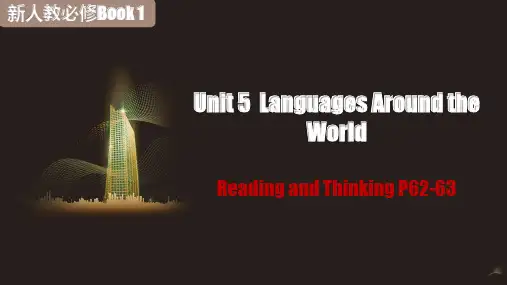

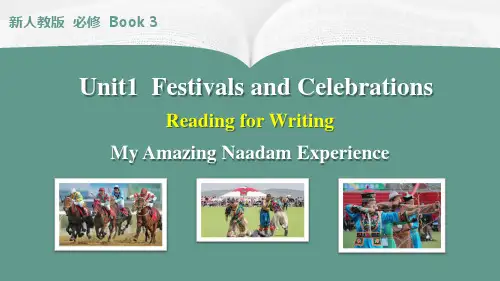
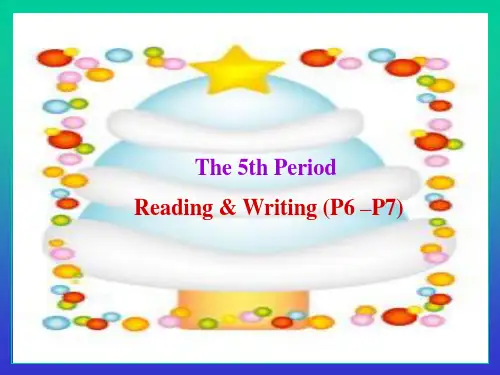
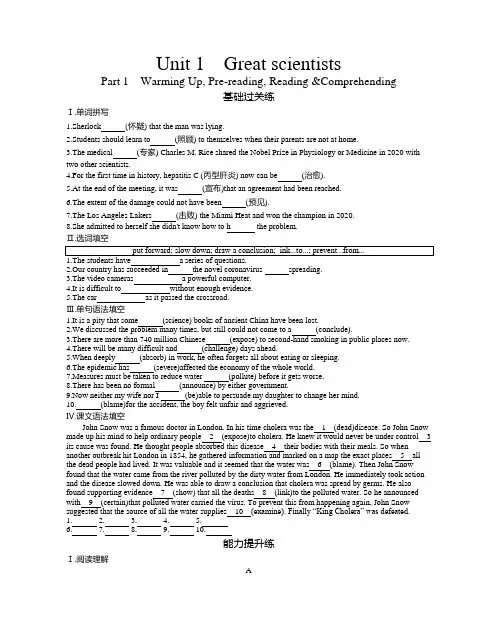
Unit 1Great scientistsPart 1Warming Up, Pre-reading, Reading &Comprehending基础过关练Ⅰ.单词拼写1.Sherlock(怀疑) that the man was lying.2.Students should learn to(照顾) to themselves when their parents are not at home.3.The medical(专家) Charles M. Rice shared the Nobel Prize in Physiology or Medicine in 2020 with two other scientists.4.For the first time in history, hepatitis C (丙型肝炎) now can be(治愈).5.At the end of the meeting, it was(宣布)that an agreement had been reached.6.The extent of the damage could not have been(预见).7.The Los Angeles Lakers(击败) the Miami Heat and won the champion in 2020.8.She admitted to herself she didn't know how to h the problem.Ⅱ.选词填空2.Our country has succeeded in the novel coronavirus spreading.3.The video cameras a powerful computer.4.It is difficult to without enough evidence.5.The car as it passed the crossroad.Ⅲ.单句语法填空1.It is a pity that some(science) books of ancient China have been lost.2.We discussed the problem many times, but still could not come to a(conclude).3.There are more than 740 million Chinese(expose) to second-hand smoking in public places now.4.There will be many difficult and(challenge) days ahead.5.When deeply(absorb) in work, he often forgets all about eating or sleeping.6.The epidemic has(severe)affected the economy of the whole world.7.Measures must be taken to reduce water (pollute) before it gets worse.8.There has been no formal(announce) by either government.9.Now neither my wife nor I (be)able to persuade my daughter to change her mind.10.(blame)for the accident, the boy felt unfair and aggrieved.Ⅳ.课文语法填空John Snow was a famous doctor in London. In his time cholera was the1(dead)disease. So John Snow made up his mind to help ordinary people2(expose)to cholera. He knew it would never be under control3 its cause was found. He thought people absorbed this disease4their bodies with their meals. So when another outbreak hit London in 1854, he gathered information and marked on a map the exact places5all the dead people had lived. It was valuable and it seemed that the water was6(blame). Then John Snow found that the water came from the river polluted by the dirty water from London. He immediately took action and the disease slowed down. He was able to draw a conclusion that cholera was spread by germs. He also found supporting evidence7(show) that all the deaths8(link)to the polluted water. So he announced with9(certain)that polluted water carried the virus. To prevent this from happening again, John Snow suggested that the source of all the water supplies10(examine). Finally “King Cholera” was defeated.1. 2. 3. 4. 5.6. 7. 8. 9. 10.能力提升练Ⅰ.阅读理解A(2021河北沧州高二上月考,)If you were asked to imagine a scientist, what image would come to your mind? The idea that most of the kids have is a man wearing a white lab coat with messy hair, big glasses, and cups of colorful liquids giving off clouds of smoke. As for adults, the majority regard scientists as strange people who spend a lot of time working in a lonely lab. However, the reality is quite different.Recently I've had a chance to take part in a scientific experience far from my lab and into Costa Rica. It has a large amount of wildlife due to its geographical placement between North and South America. It is home to more than 500,000 species (物种), which represents nearly 4% of the species worldwide!First we worked to protect wildlife at a leatherback turtle (棱皮龟) protection center. We helped the volunteers to remove rubbish from the beach to create a safe environment for turtle eggs to come out. After that we stayed at Arenal Volcano where we studied crustal(地壳的) activity linked to earthquakes. During our stay at Arenal, we rode over the mountainous areas and took a long walk through the rainforest. On the last day we got a professional introduction of rocket (火箭) science and learned about new rocket technology that will be used on the international space station.During my Costa Rica experience, I know that being a scientist doesn't mean working in a lab day and night. A scientist is the one who loves learning and getting a better understanding of the world from helping protect wildlife, learning about earthquakes or inventing rockets. I think that science is so much more than wearing a lab coat and mixing chemicals. Kids need to be aware of the excitement and adventures science can bring!1.According to Paragraph 1, scientists are often believed.A.to do experiments in messy labsB.to spend too much time in labsC.to wear clothes in a different wayD.to work in dangerous conditions2.What did the author do in Costa Rica?A.He experienced an earthquake.B.He took part in rocket experiments.C.He picked up rubbish on the beach.D.He helped the volunteers collect turtle eggs.3.What does the author learn about science from his Costa Rica experience?A.Science is full of boring experiments.B.Science is related to chemical liquids.C.Science is more than working in a lab.D.Science is about wildlife and earthquakes.4.What is the best title for the passage?A.What a Scientist Is likeB.Where a Scientist WorksC.How I Traveled in Costa RicaD.Why I Chose to Study ScienceB(2020黑龙江鹤岗一中高二上期末,)Inventor, physicist, surveyor, astronomer, biologist, artist...Robert Hooke was all these and more. Some say he was the most outstanding experimental scientist of the 17th century. In the course of his work, he cooperated with famous men of science like Isaac Newton, and the great architect Christopher Wren.Hooke's early education began at home, under the guidance of his father. He entered Westminster School at the age of 13, and from there went to Oxford, where he came in contact with some of the best scientists in England. Hooke impressed them with his skills at designing experiments and inventing instruments. In 1662, at the age of 28, he was named Curator of Experiments at the newly formed Royal Society of London—meaning that he was responsible for demonstrating (展示) new experiments at the society's weekly meeting. Hooke accepted the job, even though he knew that the society had no money to pay him!Watching living things through a microscope was one of his favourite pastimes. He invented a compound microscope for this purpose. One day while observing a cork (软木塞) under a microscope, he saw honeycomb-like structures. There were cells—the smallest units of life. In fact, it was Hooke who invented the term “cell” as the box-like cells of the cork reminded him of the cells of a monastery (修道院).Another achievement of Hooke's is his book Micrographia, which introduces the enormous potential of the microscope. It contains fascinating drawings of the thing he saw under the microscope. The book also includes, among other things, ideas on gravity, light and combustion (燃烧) that may have helped scientists like Newton when they were developing their own theoretical frameworks on these phenomena.Hooke made a valuable contribution to astronomy too. A crater on the moon is named after him in honour of his service to this branch of science.5.Why did Hooke accept the job as Curator of Experiments?A.He liked designing experiments.B.His family needed his support.C.His parents couldn't afford his education.D.He wanted to please some famous scientists.6.What does the underlined word “pastimes” in Paragraph 3 mean?A.Jobs.B.Experiments.C.Hobbies.D.Structures.7.What can we know about Hooke?A.He went to Oxford in 1645.B.He was well paid at the Royal Society of London.C.He made a contribution to medicine.D.His book Micrographia may have helped Newton.8.Which word can be used to describe Hooke?A.Honest.B.Creative.C.Reliable.D.Modest.Ⅱ.七选五(2020河南师大附中高二上期末,)How to Succeed in ScienceTo succeed in science, you need a lot more than luck. In my view, you have to combine intelligence with a willingness not to follow conventions when they block your forward path. Thus, these have come to be my rules for success.1That might sound proud, but the fact is that you must always turn to people who are brighter than you. It's like playing any game. Even as a child, I never wanted to play games with anyone who was as bad as I was. If you win, it will give you no pleasure. And in the game of science or life, the highest goal isn't simply to win; it's to win at something really difficult. 2.Take risksTo make a huge success, a scientist has to be prepared to get into deep trouble. If you are going to make a huge jump in science, you will very likely be unqualified to succeed by definition. 3. This can be more than personally upsetting.Never do anything that bores youMy experience in science is that someone is always telling you to do things, and then leaves you alone. I'm not good enough to do well in something I dislike. 4.It's very hard to succeed if you don't want to be with other scientists, because you have to go to key meetings where you spot key facts that would have escaped you. And you have to chat with your competitors, even if you find them objectionable.So my final rule is: 5.A.Meet challenges with great courageB.If you can't stand being with your real peers, get out of scienceC.Put another way, it's to go somewhere beyond your ability and come out on topD.Be sure you always have someone to save you from a deep messE.Avoid foolish peopleF.In fact, I find it hard to do well in something I likeG.Besides, you even have to be prepared to disbelieve your scientific heroes1. 2. 3. 4. 5.答案全解全析Unit 1Great scientistsPart 1Warming Up, Pre-reading,Reading &Comprehending基础过关练Ⅰ.1.suspected 2.attend 3.expert 4.cured 5.announced6.foreseen7.defeated8.handleⅡ.1.put forward 2.preventing;from 3.are linked to 4.draw a conclusion 5.slowed downⅢ.1.scientific考查形容词。
Unit 5 Book 1 Reading Favorite FoodTeaching plansZhang YongluOne .Teaching aimsⅠ、Target languagesa. Hot words and phrasesfavorite , hungry , fried , different , popular , important , festival , weekend , during , save , health in fact , fast food , in fact , the most popular , like to do sth , more and more , be popular in…, order…from …, be good for …b. Useful expressions1.Spring Festival and New Year’s Day2.People in different countries have their different favorite food .3.In the north of China ,the most food is dumplings.4.They think getting together is the most important thing during afestival .5.Some kinds of American food have become more and morepopular in China .6.Ordering food from a restaurant is a way to save time .7.In fact ,it is not good for your health to have to much fast food . Ⅱ、Ability goalsHelp students to learn the different food cultures between thecountries .Ⅲ、Learning ability goalsAfter learning something about the favorite food , students should master some Hot words and Useful expressions about the favorite food .Two . Teaching important pointsHelp students to learn something about favorite food and different diet cultures of different countries .Three. Teaching difficult pointReading skills and how to improve students’reading comprehension. Four . Teaching methods•Listening ·Reading ·discussingFive .Teaching aids• A recorder ·A projector ·A computerSix .Teaching procedures and waysStep 1 RevisionCheck the pronunciation of the words of unit 5Ask the students to read the words together and each word three times . Then check the pronunciation.Step 2 Lead-inT: What’s your favorite food ?S1: My favorite food is dumplings .S2: My favorite food is beef .S3: My favorite food is hamburger .T: Ok , good. Do you know the favorite food of the Englishman and Americans ?Ss: hamburgers ?T: Here is the answers of the question . Please read the reading text by yourselfStep 3 Integrating SkillsAsk the students to read the text quickly and find out the following questions . Show the following on the Powerpoint.1. What is the favorite food of the Italian people ?2. What do Japanese like to eat?3 . What do most Chinese people think is the most important thing duringa festival ?4. Do you think it is good for your health to have too much fast food ?Suggested answers :1.Italian people like to eat pizza .2.Japanese like to eat fish and the fish is usually not cooked .3.They think getting together is the most important thing during a festival .4.No , I think eat too much fast food is not good for ourselves . Step 4 Careful readingRead the text carefully and ask students to focus on the information of “ favorite food”T: Now please read the text for the second time . This time please read it carefully and focus on the information of “favorite food”After reading the text , you are required to finish the practice Ⅰon the Page38. You may discuss it in your group after you finish the exercise . You are given 8 minuets and 8 minuets later we will check the answers together .8 minuets later ask the spokesman in each group to speak out their answers . Show the suggested answers on the Powerpoint .1. different2.In the north3.getting together ; during the festival4. go to restaurants ; many kinds of5. In fact6. a way to save time7.have to8. come back home9. more and more popular 10. not good for your healthAfter checking the answers, show the Hot words and Useful expressions on the Powerpoint and give an example to each of them. And then, play the tape for students to listen the reading text . Then do Workbook exercises 1&2 on Page24.Step 5 HomeworkAfter we learning the text , please discuss the following questions :1. What is the fast food ?2. Can you give us some examples ?3. Do you think fast food is good ?。
Book5 Unit1 Great scientists—Reading编制:审稿:时间:2014-09-01I. Pre-reading: Read the passage on P2 and choose the best answer.1.What does the passage mainly talk about? __________________A.John Snow was a famous doctor in London.B.The reason that caused the deadly disease cholera.C.John Snow solved the problem of cholera.2.Which of the following theories did John Snow believe in? ________________A.A cloud of dangerous gas would float around until it found its victims.B.People absorbed cholera into their bodies with their meals.C.People got infected with cholera because of cold and hunger.3.Before 1854,when cholera broke out,________ .A.many thousands of people diedB.people with cholera could be curedC.John Snow began to know its cause4.How did he find out the cause of the disease? _______________A.By living in the area where cholera broke out.B.By marking a map where all the dead people had lived.C.By telling the terrified people how to prevent it.5.What do you think the Londoners would do with the unused pumps after defeating “King Cholera”?_____________________A.They would destroy them.B.They would reuse them after cleaning.C.They would desert them for good.II. Careful-reading :Read the passage again and answer the following questions.1. What happened in 1854? Who defeated “King Cholera”?______________________________________________________________ .2. How many people died in ten days?______________________________________________________________.3. 1.Why couldn’t the cholera be under control at first?______________________________________________________________.4. Which theory did John Snow believe in?_____________________________________________________________.Long and difficult sentences.1. Neither its cause nor its cure was understood.翻译:________________________________________________________________.【句型剖析】:本句中neither…nor…连接并列主语,谓语动词遵循_____________原则,即谓语动词要与最近的那个主语保持一致。
Unit 5 Book 1 课堂导学案(二)2009年月日教学课题:Reading ----Nelson Mandela—a modern heroTeaching aims and requirements1.to improve the students reading skills and speed, especially the skills ofsummarizing ,word guessing and scanning.2. Help students underline some important words , expressions ,and sentencepatterns ,and analyze difficult sentences if possible.The important points :some new words and expressionsThe difficult points :improve the students’ ability of comprehensionI.课前延伸:Important words and phrases1.质量;品质;性质n._________2. 吝啬的;自私的adj.__________3.积极的;活跃的adj.___________4. 慷慨的;大方的adj.___________5.自身;自我n. _________自私的adj. _________ 无私的;忘我的adj.__________6.献身;专心于v. _________ 忠实的;深爱的adj. ___________7.法则;原则;原理n. __________ 8. 指导,指领n.____________9.投票;选举n./v. _____________ 10.进攻;攻击;抨击v.___________ 11.相等的;平等的adj._________ 12.乐意的;自愿的adj.____________ 13.失业___________ 14.事实上___________ 15.使充气;爆炸______________ 16.在危险、痛苦、受罚、忧虑等的环境中_________ 17.求助于;致力于_______ II.合作探究:Step I: warming and pre-readingNames What he did His qualities Is he a great man? William TyndaleNorman BethuneSun Yat-senMohandas GandhiNelson MandelaNeil ArmstrongStep II: Reading1.Fast reading:Read the passage quickly and find out the meaning of each Para?Para. 1 A. Mandela’s help to EliasPara. 2 B. Basic(基本的) information of EliasPara. 3 C. Elias’ poor education and his problemPara. 4 D. Elia s’ support(支持)to MandelaPara. 5 E. Black people’s problems2.Careful reading:Finish the Ex. 1&2 on page 35 .III.课后拓展Fill in the blanks:Elias was born in 1940. At the age of six, he______ school. However, he had to ______school in 1948 because his family could not _______ the school ______and the bus _____. After trying hard, Elias got a job. Unfortunately, he was almost ___ ___ work since he had no _________to live in Johannesburg.Elias felt it a very ________ period of his time. It was in 1952 that Elias met Nelson Mandela. He offered ________ to Elias, which made Elias______ .Therefore when Nelson Mandela organized_______, he joined it. In 1963, Elias helped Nelson Mandela ______ ______ some government buildings. He believed Mandela would help to make black and white people ______.Let Let there be justice for all.Let there be peace for all.Let there be work, bread, water and salt for all.让所有人得享正义。
必修5 Unit1 Great scientistsPart 1. Warming up1.explain及物动词(vt.)解释;说明;阐明[(+to)][+wh-][+(that)]He explained that he had been cheated. 他解释说他是上当受骗了。
Can you explain how the machine operates?你能解释一下这机器是如何运转的吗?Please explain this rule to me.请给我讲解一下这条规则。
不及物动词(vi.)解释;说明;辩解I've got to explain about it. 我得解释一下此事。
2.characteristicn. 特征;特性Kindness is one of his characteristics.adj. 独特的I heard my friend’s characteristic laugh.be characteristic of sb./sth. 是.....的特性Such bluntness is characteristic of hin. 如此迟钝是他的特性。
3. Who put forward a theory about black holes?put forward 提出(建议等);提名;提前,把时钟往前拨He put forward a new plan. 他提出一个新计划。
May I put your name forward as a possible chairman of the committee?我能否提名你当委员会主席?[归纳拓展]put down 记下;镇压put out 关掉;熄灭put aside 放在一边;储存;保留put off 推迟;延期put up 建造;举起;张贴put on 穿上put away 收好选词填空(put off, put up, put forward, put aside, put out)①The plan that you _____ at the meeting is wonderful.②Many tall buildings were _____ along the road.③Firefighters have been called to _____ the fire in the city center.④He has a little money to _____ for a rainy day.⑤Don’t _____ until tomorrow what can be done today.Part 2. Pre-reading, reading and comprehending1. Do you know how to prove a new idea in scientific researchhow to prove a new idea 为“疑问词+不定式”结构,该结构可在句中作主语、宾语、表语等。
Unit 1 Great scientists Reading 课时作业Ⅰ 单句语法填空1.He had a good disguise, but as soon as he spoke he betrayed____________(he).答案: himself2. That student admitted ____________(cheat) in the math exam , promising that he would neverdo that again in the future.答案: having cheated3. He pretended ____________ (read) an important paper when the boss entered.答案: to be reading4. George is going to talk about the geography of his country,but I’d rather he focused more____________ its culture.答案: on5. It ’ s bad manners ____________ (speak) ill of someone in his absence.答案: to speak6. Mary often argues ____________ her friends about small things angrily , which sometimesmakes them very unhappy.答案: with7. The child was told to ____________ (apology) for being rude to his mother.答案: apologize8. While we can’ t change the body type we are born with ,we can’ t blame our genes____________ making us fat.答案: for9. Every time he sees people ____________ trouble , he always lends them a hand.答案: in10. Supply has to keep pace ____________ increasing demand.答案: withⅡ 阅读理解“ Hey, how are you doing? I ’m Courtney. What grade are you in? What’s your favorite?book Elephant and Piggy? Yeah, I got it.”If you thought you ’d walked into a library with a greeting like that, you wouldn’t be too faroff. In fact, you ’ ve entered the workplace of Courtney Holmes, the Storybook Barber.Two years ago, Dubuque, Iowa, held its first yearly Back to School Bash, offering needy families an opportunity to learn about free resources(资源 ) in the community( 社区 ). Holmes agreedto participate. Saturday was his busiest haircutting day, but he chose to donate his time andgive free haircuts to underprivileged kids so they then he had a lightbulb moment( 忽然觉悟的一瞬having to read a book to me ,” Holmes said.’ d look sharp on that first day of classes. But ):“ The kids should earn their free haircut byThe idea was so popular that he continued it for the next two years. Five - to ten- year- old boys would grab a favorite book, settle into the barber chair, and read aloud while Holmes cut their hair. If they stuttered( 结结巴巴地说 ) over a word, Holmes was there to help.After the haircut, they ’ d review the book, from the characters and vocabulary to the themes —just like in school, only more fun.Holmes admits he, too, benefits from the free snip - and- reads.“ There was this seven- year- old Bob, who struggled through his book, stuttering over wordseven though he didn ’ t have a stutter ,”said Holmes. He had the boy take the book home and practice. When the child came back a few days later ,“ He read it with no problems. That inspires me.”Holmes and his family have recently moved from Dubuque to a Chicago suburb. When they get settled, he plans to continue his role as the Storybook Barber.“ The way the world is today with guns and violence,” he says, “ it’s a safe haven(避风港 ) for the kids, to come to the barbershop and read books.”【解题导语】本文是一篇记述文。